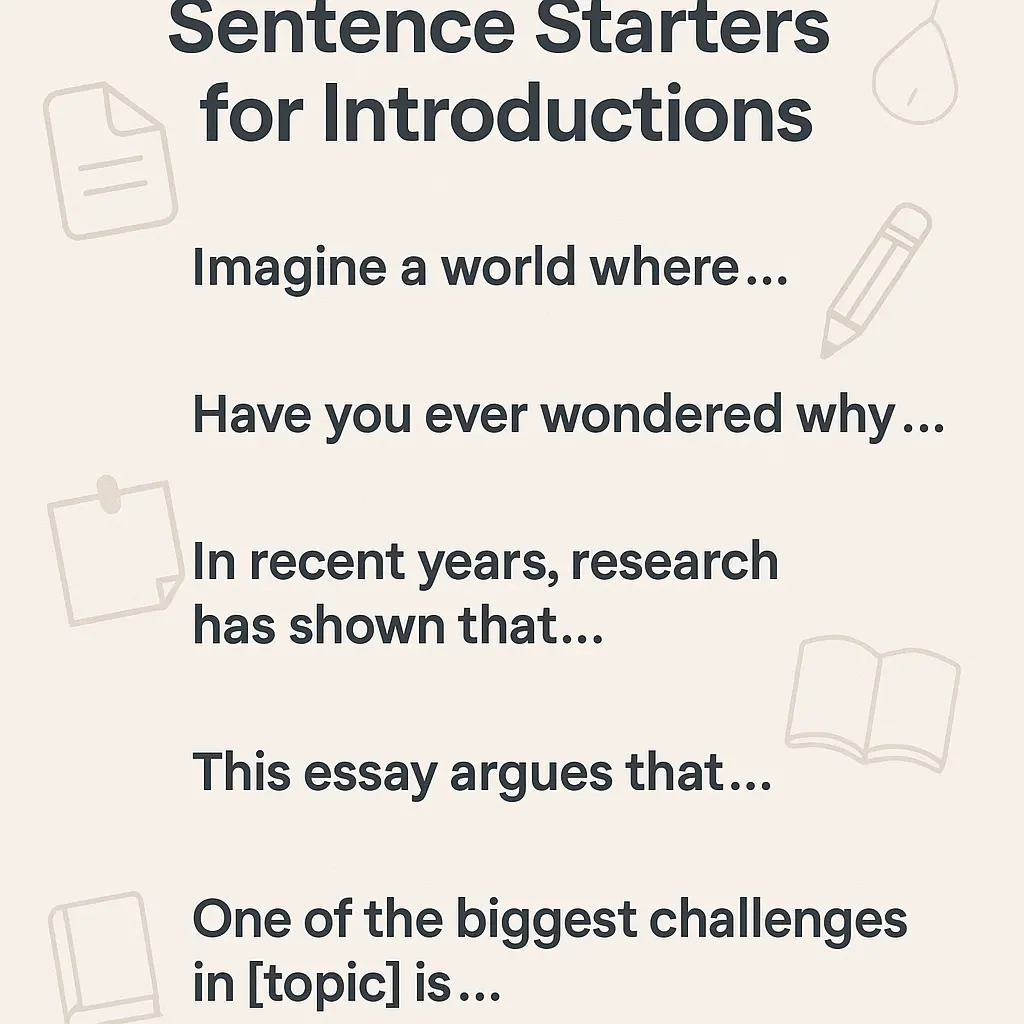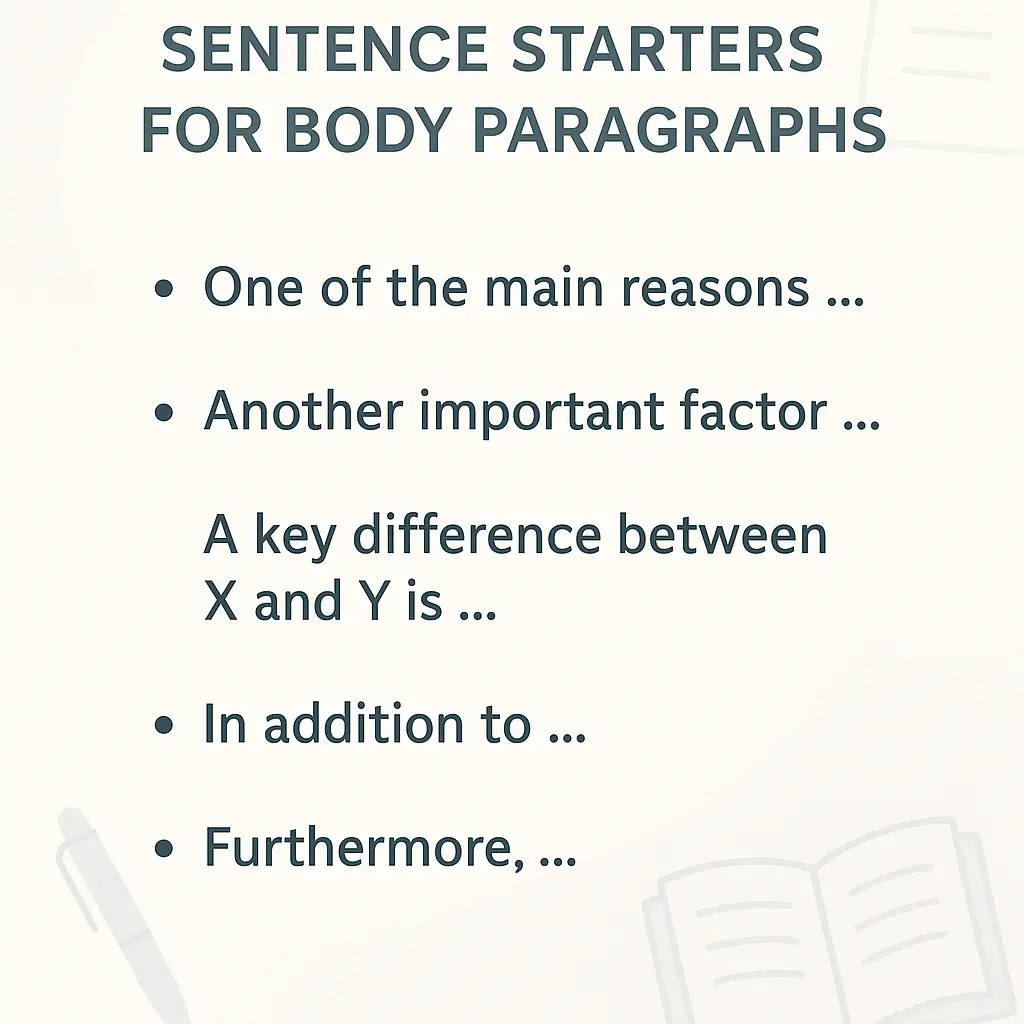Sentence Starters for Essays: Powerful Examples & 5 Mistakes to Avoid
Struggling with essay flow? Discover dozens of effective sentence starters for introductions, transitions, conclusions & more. See common mistakes & how to avoid them. Improve your academic writing today.
Sentence starters are short words or phrases you use at the beginning of sentences. They signal what kind of idea is coming—contrast, example, addition, conclusion, etc. They help readers follow your flow without getting lost. If your essay feels choppy, weak, or hard to read, weak or missing sentence starters are often the culprit.
Here’s why they matter:
- They guide the reader through your thoughts.
- They improve coherence (so your ideas don’t feel like disconnected islands).
- They make your writing feel polished — it shows you thought about transitions, not just dumping sentences one after another.
How Using Strong Sentence Starters Improves Flow, Coherence, and Reader Engagement
Strong starters are like the signposts on a hiking trail. Without them, people wander, get confused, or lose interest. If you’re using strong essay starters, it will naturally help you to build a better sentence, and organize a paragraph more appropriately. Whilst EssayOra helps you in case you struggle, it's still better to be able to write and expand essays by yourself.
Here’s what strong starters do:
- Smooth transitions: Let’s you move from one idea to another without jolting the reader.
- Set expectations: If you start with “however,” the reader knows you’re going to contrast. If “for example,” they expect illustration.
- Support your argument: They help emphasize what matters. You can lead in with “Above all,” “Most importantly,” etc.
- Keep the reader hooked: They minimize friction. Someone reading should never have to stop and think “Wait — how does this relate?” Strong starters make that less likely.
Who This Guide Is For?
This article is for anyone who wants essays that are easier to read, stronger, and more persuasive. Specifically:
- Students (high school, college) who struggle with organization, transitions, or boring intros/conclusions.
- ESL / EFL writers who need a bank of starters to help structure essays.
- Anyone writing under pressure (tests, timed essays) who wants tools to write fast without losing clarity.
- Teachers or tutors who help learners polish essays.
Types of sentence starters & when to use them?
Below: proven sentence starters, grouped by purpose. Use the right type in the right spot. That’s what separates average essays from sharp ones.
1. Starters for Introductions (Hooks, Thesis Leads)
These grab attention and set the tone. Your intro should pull someone in and clearly tell them what the essay does.
When to use these: Opening paragraph; first few sentences; when you need to show relevance or importance.
Good starters:
“Imagine a world where …”
“Have you ever wondered why …”
“In recent years, research has shown that …”
“This essay argues that …”
“One of the biggest challenges in [topic] is …”
2. Starters for Body Paragraphs (Topic Sentences)
These establish what the paragraph will cover. Strong topic sentences help readers follow the structure.
When to use: Every body paragraph should begin with this type. Especially the first sentence in each paragraph.
Good starters:
“One of the main reasons …”
“Another important factor …”
“A key difference between X and Y is …”
“In addition to …”
“Furthermore, …”
3. Starters for Transitions / Linking Ideas
These smooth the flow. They help move from one idea or paragraph to the next without readers getting lost.
When to use: Between body paragraphs; within paragraphs when shifting from one point to another.
Good starters:
“However, …”
“On the other hand, …”
“Similarly, …”
“Conversely, …”
“Moreover, …”
Related: How to Write a Powerful Essay Hook That Grabs Attention (With Examples)
4. Starters for Arguments & Counterarguments
These help you present your case and address opposing views. Strong essays do both.
When to use: In argumentative / persuasive essays; when you want to show balance; when refuting or acknowledging an opposing view.
Good starters:
“It is widely believed that …”
“One argument in favor of …”
“Opponents of this view argue that …”
“While this claim holds merit, …”
“Nevertheless, …”
Related: Descriptive Essay Writing: 7 Steps to Write an Effective Descriptive Essay
5. Starters for Examples & Evidence
They introduce proof, data, quotes, or cases. Without this, your argument sounds like opinion.
When to use: After making a claim; when introducing a study, quote, statistic, case-study, historical example.
Good starters:
“For example, …”
“According to [source], …”
“A study published in … reveals …”
“As demonstrated by …”
“To illustrate, …”
6. Starters for Contrast / Comparison
Used when you want to show similarities or differences, or to contrast two things.
When to use: Compare/contrast essays; when critiquing; when showing what something is not as much as what it is.
Good starters:
“In contrast, …”
“On the other hand, …”
“Similarly, …”
“Likewise, …”
“Whereas …”
7. Starters for Cause & Effect
These show what causes what, or what results from something. They help logic and flow (very important in academic writing).
When to use: In essays discussing reasons / consequences; in analysis; when showing results of a study or event.
Good starters:
“As a result, …”
“Consequently, …”
“Therefore, …”
“Due to …”
“For this reason, …”
8. Starters for Conclusions / Summaries
The closing matters. These signal wrap up, restate, leave impression. Strong conclusions linger.
When to use: Final paragraph; last few sentences; where you summarise, restate thesis, or call to action.
Good starters:
“In conclusion, …”
“To sum up, …”
“Ultimately, …”
“All things considered, …”
“Given the evidence …”
9. Starters for Adding Emphasis / Showing Uncertainty / Nuance
These let you stress something, or show caution, or nuance. They make writing more honest, balanced, polished.
When to use: When you want reader to focus; when a claim is not fully certain; when softening your language; improving credibility.
These are particularly useful when you're writing explanatory essay.
Good emphasis / nuance starters:
“Above all, …”
“Most importantly, …”
“Undoubtedly, …”
“It may be that …”
“Although not proven, …”
Common Essay sentence starting mistakes & how to avoid them?
These are the traps most people fall into when using sentence starters in essays. Skip them, and your writing will improve fast.
1. Over-dependence on Generic Starters
The problem: Everyone uses the same ones over and over: “In conclusion,” “Firstly,” “To begin with,” etc. When generic starters dominate, your essay sounds formulaic, flat, obvious.
Note: Avoid overusing essay introduction sentence starters, conclusion sentence starters that everyone uses.
How to avoid:
- Use a mix: sometimes start with something unexpected (a quote, question, fact), then use more standard phrases.
- Keep a phrase bank of less common starters (emphasis, nuance, cause/effect) so you have options.
- Read your draft and highlight every starter. If too many are generic, replace some.
Example:
Weak:
“Firstly, good leadership is important. Secondly, communication is key. In conclusion, teamwork matters.”
Better:
“Good leadership shapes outcomes. Communication binds teams. Ultimately, teamwork sets the tone.”
2. Repetition (Using the Same Starter Too Often)
The problem: Even if the starters are good, using the same one five times makes readers tune out. It drags, feels lazy.
How to avoid:
- Keep a running list of starters you’ve used; when you see duplicates, swap them.
- Use different types of starter depending on the move you’re making: contrast, addition, consequence, etc.
- Use synonyms or change structure: instead of “Furthermore,” try “Moreover,” or restructure so you can start with something else.
Example:
Weak:
“Moreover, the study shows … Moreover, students benefit … Moreover, the results confirm …”
Better:
“Moreover, the study shows … In addition, students benefit … These results also confirm …”
3. Starters That Are Too Informal or Off-Tone for Essays
The problem: Essays (especially academic) require a certain tone. Starters like “Hey,” “So,” “You know,” “Like,” or “Okay,” sound conversational. That’s okay sometimes, but mostly they weaken your voice.
How to avoid:
- When revising, read each paragraph start aloud. If it sounds like a conversation, change it.
- Swap out informal starters for formal equivalents: e.g. “In contrast,” “Furthermore,” “Nevertheless.”
- Avoid slang, filler words, casual connectors at the start (e.g. “So,” “Well,” “Like”).
Example:
Weak:
“So, climate change is a major issue in 2025.”
Better:
“Climate change remains a major issue in 2025.”
4. Starters That Mislead or Weaken the Argument
The problem: Using the wrong starter communicates the wrong relation. For example: “However” implies a contrast when you mean addition. “Similarly” implies likeness when you mean difference. That misleads the reader, undercuts clarity.
How to avoid:
- Know what relation you’re showing (contrast, addition, cause & effect, example, etc.). Pick a starter that matches.
- When you write, double-check: does “However” make sense here? Or is “For example” more accurate?
- If you get feedback or revision time, trace each starter to see if it aligns with the argument flow.
Example:
Misleading:
“Similarly, the policy reduced carbon emissions.” (But you’re actually showing how it was different from what was expected.)
Fixed:
“In contrast, the policy failed to reduce carbon emissions.”
5. Not Matching the Starter to the Purpose
The problem: Each type of paragraph or sentence has a job: introducing, arguing, giving evidence, comparing, concluding. If your starter doesn’t fit that job, the writing feels off. Eg you put a contrast starter where you’re giving evidence, or a conclusion starter too early.
How to avoid:
- Identify the function of each paragraph (or sentence) before choosing a starter. Is it evidence, contrast, summary, etc.
- Use a cheat-sheet: list of starters by purpose. When writing body paragraphs, stick to “topic sentence starters” or “example/evidence starters.” When concluding, use “conclusion-style starters.”
- During editing, check: does each starter match what follows? If not, revise.
Example:
Wrong starter-use:
“However, students performed well on the test.” (But this sentence is giving evidence, not contrasting.)
Better:
“For example, students performed well on the test.”
Wrapping up
To wrap up, sentence starters are simple words, but when used right, they change how your essay reads. They boost clarity, sharpen your argument flow, and keep readers from getting lost. Avoid overused phrases, make sure each starter matches its purpose, and vary them so your writing feels fresh. Practice picking introductions, transitions, conclusions more intentionally. Over time, you’ll instinctively reach for the right starter rather than a generic one. Use the lists above. Study examples. Rewrite weak paragraphs. That’s how you turn good essays into great ones.


